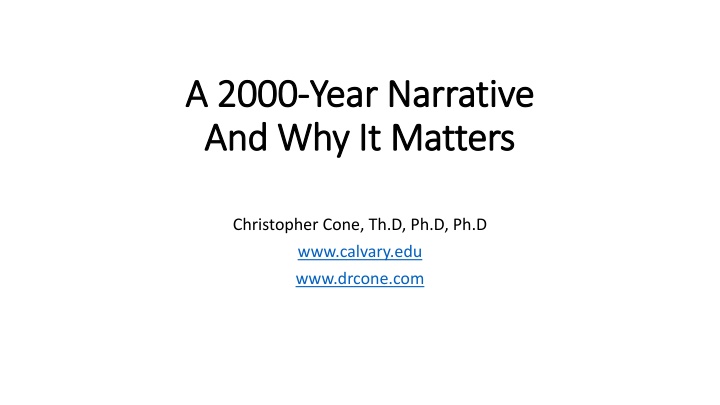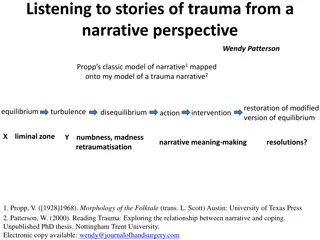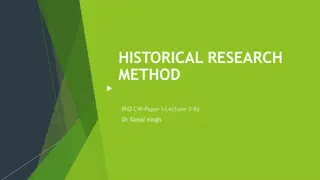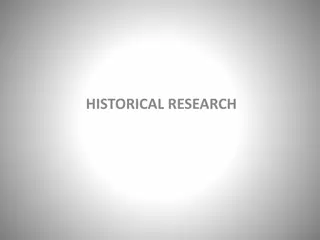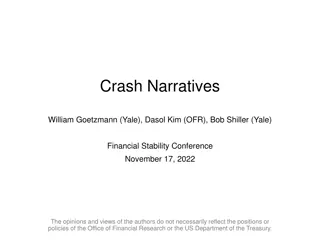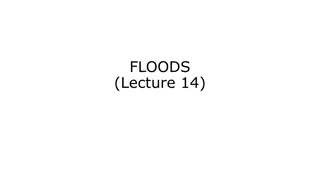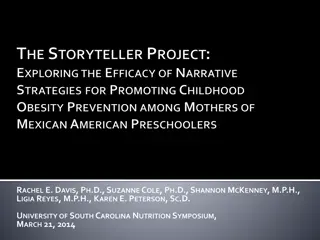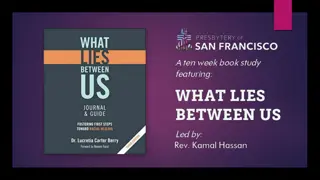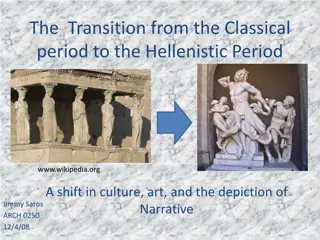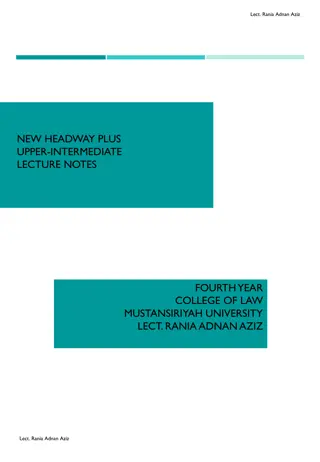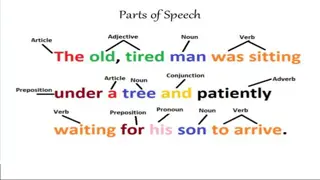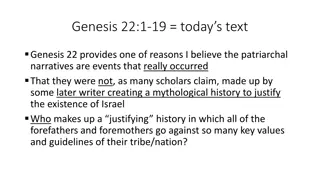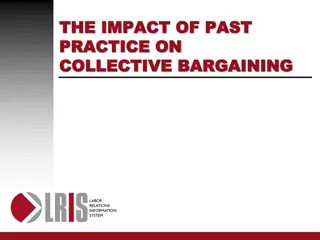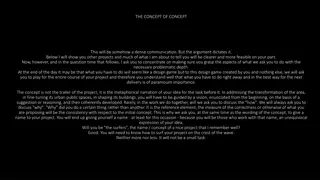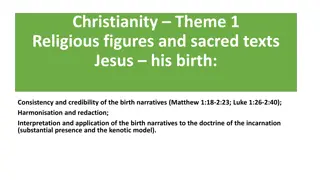Historical Narratives: The Significance of Past Events
Delve into the importance of learning from history to avoid repeating past mistakes in theological controversies. Understand two historiographic approaches for studying events over the past 2000 years and explore critical issues that have shaped our understanding of God and spirituality. Discover the evolution of the Church from its early beginnings in the first century to its prophesied role today.
Download Presentation

Please find below an Image/Link to download the presentation.
The content on the website is provided AS IS for your information and personal use only. It may not be sold, licensed, or shared on other websites without obtaining consent from the author.If you encounter any issues during the download, it is possible that the publisher has removed the file from their server.
You are allowed to download the files provided on this website for personal or commercial use, subject to the condition that they are used lawfully. All files are the property of their respective owners.
The content on the website is provided AS IS for your information and personal use only. It may not be sold, licensed, or shared on other websites without obtaining consent from the author.
E N D
Presentation Transcript
A 2000 A 2000- -Year And Why It Matters And Why It Matters Year Narrative Narrative Christopher Cone, Th.D, Ph.D, Ph.D www.calvary.edu www.drcone.com
Why? Why? Those that fail to learn from history are doomed to repeat it George Santayana (The Life of Reason, 1905-1906) Nothing new under the sun contemporary theological controversies rooted in historical debates Today s novel theological resolution may simply be yesterday s theological error. Learning the past aids us in avoiding the errors of the past. We should understand the forces that drive history, so we can recognize them when they are upon us. History teaches us that in responding to error, we should search the Scriptures for the truth, rather than formulate theologies that will resolve the issue.
Two Historiographic Approaches Two Historiographic Approaches Chronological considering persons, events, and movements as they happen, viewed in immediate chronological context (e.g., Eusebius, Shelley) Advantages can best see the flow of history Disadvantages difficult to trace issues, doctrinal development Topical considering persons, events and movements within their related context to focus on the issues themselves (e.g., Hannah) Advantages helpful for understanding doctrinal development Disadvantages less clarity on overall flow of history
Eight Issues in the Past 2000 Years Eight Issues in the Past 2000 Years Issue #1 Issue #2 Issue #3 Issue #4 Issue #5 Issue #6 Issue #7 Issue #8 What Did God Say? What Did God Mean? How Can We Know? Is God Three or One? Who is Jesus Christ? How Does God Save? How Does the Holy Spirit Work? What is Going to Happen?
The Setting of the Church The Setting of the Church God s Focus on Israel The Covenants The Kingdom Offered, Rejected, Postponed (Mt 12-13) The Church Prophesied (Mt 16) The Preface (Acts 1:3-8) God s Focus on the Church
The Church in the First Century The Church in the First Century (Apostolic Age) (Apostolic Age) 33-35 30s -63 64 66-67 Martyrdom of Paul, Peter 70 Roman destruction of Jerusalem, Temple under Titus 64-90 Apostolic age, completion of the NT The launch (Acts 2) Acts descriptive, not prescriptive Intense persecutions begin under Nero
Historical Books of the NT (5) Historical Books of the NT (5) Matthew (45) Jesus is king Mt 4 gospel of the kingdom Mt 11 John is the messenger, conditional Elijah Mt 12 Jesus rejected, predicts death, resurrection Mt 13 Jesus teaches in parables Mt 16 church announced Mt 27-28 Jesus death, burial, resurrection Mark (50) Jesus is servant Luke (60) Jesus is man John (80) Jesus is God Acts (63) events of the early church
Pauline Epistles (13) Pauline Epistles (13) 1and 2 Thessalonians (50-51) future hope 1 and 2 Corinthians (54-55) growth expected Galatians (56) walk in grace, not law Romans (57) the mercies of God and how believers should respond Philippians (61) joy even in suffering Philemon (63) forgiveness, brotherhood Ephesians (63) position and walk Colossians (63) supremacy of Christ 1 Timothy (65) importance of sound teaching Titus (65) importance of sound teaching 2 Timothy (67-68) purity even in persecution
General Epistles (8) General Epistles (8) James (48) put faith into practice Hebrews (64-67) supremacy of Christ 1 and 2 Peter (65-67) joy, perseverance in suffering Jude (65-80) contend for the faith 1,2, and 3 John (80-85) love
Prophetic Books (1) Prophetic Books (1) Revelation (85-95) prologue Rev 1-3 the church Rev 4-19 tribulation period Rev 19 return of Jesus Rev 20 kingdom established Rev 21-22 eternity
Issue #1 Issue #1 What Did God Say? What Did God Say?
Issue #1: What Did God Say? Issue #1: What Did God Say? The OT Canon The OT Canon 1400-400 BC OT books are written 200 BC 70 rabbis translate OT from Hebrew to Greek. 300-XXX BC Apocryphal books written in Greek, and added to the LXX: Tobit, Judith, 1 and 2 Maccabees, Wisdom of Solomon, Sirach [or "Ecclesiasticus"], and Baruch The LXX or Septuagint ultimately comprised of 46 books 30-33 Jesus confirms the structure of what came to be known as the TaNaKh, which included 22 Hebrew books (what is known as the current 39 books of the OT, with some books divided) e.g., LK 11:49-51, 24:44
Issue #1: What Did God Say? Issue #1: What Did God Say? The OT Canon The OT Canon 100 rabbis at the Council of Jamniah include in their canon only 39 books that were originally in Hebrew (excluding apocryphal books) 400 Jerome s Latin Vulgate translates the 39 as the OT, identifies the additional 7 as apocrypha, and includes them, but not as OT. The Catholic churches considers them all inspired 1536 Luther translates the Bible from Hebrew and Greek to German. Recognizes 39 as OT, includes the additional 7 as an appendix, calling them "Apocrypha 1546 The Catholic Council of Trent affirms the canonicity of all 46 books
Issue #1: What Did God Say? Issue #1: What Did God Say? The NT Canon The NT Canon 30-33 Jesus commissions NT writers (Jn 16:12-15, Acts 9) All NT books written by these men or by men directly connected with Jesus (Jude, James) or connected to apostles (Mark, Luke) 45-85 The NT books are written 70-110 Other notable writings: Didache (70), 1 Clement (96), the Epistle of Barnabas (100), and 7 letters of Ignatius of Antioch (110) 144 The Marcionism Controversy: Marcion argues that OT and NT presents two different gods, discards the OT and some of the NT. The church forced to address the canonicity issue.
Issue #1: What Did God Say? Issue #1: What Did God Say? The NT Canon The NT Canon 200 Several canons emerge Muratorian Canon (4 Gospels, Acts, 13 letters of Paul, 1-2 John, and Jude, + the Apocalypse of Peter) 367 Athanasius Easter Letter lists the NT books as we know them today. 397 The Third Council of Carthage affirmed the 27 NT books (but also included the Apocryphal books as part of the OT) 1536 Luther s translation included all NT books, but moved Hebrews, James, Jude, and Revelation to the end, identifying them as less than canonical. 1546 The Catholic Council of Trent affirms the list of 27 as canonical
Issue #2 Issue #2 What Did God Mean? What Did God Mean?
Issue #2: What Did God Mean? Issue #2: What Did God Mean? Hermeneutics Hermeneutics Greek allegorists Philo (20-54) blended Platonic ideas with the Bible Clement of Alexandria (150-215) five possible meanings: historical, doctrinal, prophetic, philosophical, mystical Origen (184-254) spiritual exegesis, typological and allegorical Augustine (354-430) 2 Cor 3:6 literal kills Luther (1483-1546) representative of Reformation: very opposed to allegorism in all areas but prophecy, held to the primacy of original languages
Issue #2: What Did God Mean? Issue #2: What Did God Mean? Hermeneutics Hermeneutics Spinoza (1632-1677) literalistic, but added a higher criticism element. Jewish literalists J.N Darby (1800-1882) synthesized Scripture recognizing LGH C.I. Scofield (1843-1921) Scofield Bible, first study Bible utilizing LGH 1948 Return of the Jewish state, helped popularize LGH applied to Biblical Prophecy Postmodernism contradicted LGH 1960 s Present Already not yet and realized eschatology
Issue #3 Issue #3 How Can We Know? How Can We Know?
Issue #3: How Can We Know? Issue #3: How Can We Know? Epistemology Epistemology Premodernism tradition based on superstitions Modernism tradition challenged on the basis of reason Rise of rationalism & The Enlightenment due to Scholasticism/Intellectualism of the 16thcentury, rise of empirical science (heliocentric theory of Copernicus (1473-1543), popularized by Galileo (1564-1642), Newton s (1642-1727) law of gravity, and understanding of underlying principles of the universe) Reformation 1517 Rene Descartes (1596-1650), Catholic, doubted all but his own ability to reason. Cogito ergo sum I think therefore I am. Reason is the basis of knowledge David Hume (1711-76) father of British skepticism, argued for the impossibility of proving the soul, experience is the basis of knowledge Postmodernism rejection of the modern project and related absolutes Friedrich Nietzsche (1844-1900) father of existentialism, foundation of postmodernism
Issue #4 Issue #4 Is God Three or One? Is God Three or One?
Issue #4: Is God Three or One? Issue #4: Is God Three or One? Isaiah (740-680BC) God is three and one (Is 48:11, 16) Clement of Rome (101) As God lives, and the Lord Jesus Christ lives, and the Holy Spirit Marcion (144) Gnostic, dualism between OT and NT God, Christ inferior Ebionites (2ndcentury) from ebionim (poor), Christian Judaizers, Jesus more human than divine Tertullian (160-225) first used the term trinitas in describing plurality of God Clement of Alexandria (150-215) referenced eternal generation of the Son, defending the trinity Novation (200-258) shows confusion on the Spirit, recognizing role in revelation, but ranking below angels at times (subordinationism)
Issue #4: Is God Three or One? Issue #4: Is God Three or One? Irenaeus (2ndcentury) three distinct persons Sabellius (3rdcentury) Modalism (monarchianism), God manifests in modes Michael Servetus (1511-1553) Unitarian, denied trinity and deity of Christ tried to return Christianity to its original form as he perceived it. Socinianism (16thcentury) singularity of essence, singularity of persons, reject trinity Unitarianism (17thcentury) rejects trinity, Biblical infallibility, original sin, and more recently, hell. Liberal theology (18thcentury) exploded rationalistic perspectives of God Oneness Pentacostalism (20thcentury) modalism (R.E. McAlister, Asuza Street, Jakes) Postmodern (20th) mystic, pantheistic, process theology (Paul Tillich)
Issue #5 Issue #5 Who is Jesus Christ? Who is Jesus Christ?
Issue #5: Who is Jesus Christ? Issue #5: Who is Jesus Christ? Docetism 1st century, from Gr. dokeo (seem) Jesus just seemed to be human but wasn t (Islam, for example docetic, Sura 4:157-158) Ignatius responded. Celsus 2nd century Greek philosopher: if Jesus became man, he changed, and thus not God (not immutable). Origen responded. Sabellius (3rd century) Modalistic monarchianism (Unitarianism) Arius (250-336) subordinationist regarding Christ: eternal but not sharing the Father s eternality Council of Nicea, 325 to deal with the Arian controversy Apollinarius (310-390) - Jesus more divine than human. What are implications? (substitutionary atonement denied). View challenged by Gregory of Nazianzus (330-390), and condemned at Constantinople 381.
Issue #5: Who is Jesus Christ? Issue #5: Who is Jesus Christ? Nestorius (386-451) Jesus two natures not really enjoined, but separate (two Christs). Eutyches (378-454) two natures became one (not fully God fully man). Council at Chalcedon, 451 condemned his view. Council of Chalcedon, 451 - truly God and truly man the distinction of the two natures being preserved concurring in one person. West distinguished between person and nature / East did not, creating a schism between West (dual nature) and East (monophysite). Socinianism (16thcentury) singularity of essence, singularity of persons, reject trinity denied preexistence of Christ Mormonism (1820) Jesus a god in the same way we can become one, and as Adam and Joseph Smith Christian Science (1875) Jesus supreme manifestation of divine idea, not God in the flesh Jehovah s Witness (1879) a god but not God similar to Arian position
Issue #6 Issue #6 How Does God Save? How Does God Save?
Issue #6: How Does God Save? Issue #6: How Does God Save? Method of Salvation Pelagius (354-440) denied the need for divine aid, humanity not tarnished by Adam s sin .man, in effect, accomplishes his own salvation Augustine man cannot come to God without divine intervention (grace) Semi-Pelagianism (late 400s) faith begun by free will, growth accomplished by faith
Issue #6: How Does God Save? Issue #6: How Does God Save? The Atonement Iranaeus (125-202) recapitulation theory Jesus succeeds where Adam failed Origen (185-254) ransom to Satan Anselm (1034-1109) satisfaction or commercial theory Peter Abelard (1079-1142) moral influence theory Reformers/Calvin penal substitution theory logically leads to limited atonement (Jesus death canceled out the debt, hence, he must only have died for the elect) Hugo Grotius (1583-1645) governmental theory GEH Aulen (1879-1977) dramatic theory/Christus Victor
Issue #6: How Does God Save? Issue #6: How Does God Save? Calvin and Arminius John Calvin (1509-1564) he never broke into five points, but these five, formulated by his followers were specific responses to the Arminian Remonstrance: T total depravity U unconditional election (double predestination (leading to limited atonement, although an illogical conclusion) L limited atonement I Irresistible grace P Perseverance of Saints also rejected consubstantiation, rather holding to spiritual presence by faith; *built upon the theological framework of Augustine
Issue #6: How Does God Save? Issue #6: How Does God Save? Calvin and Arminius Jacobus Arminius (1560-1609) Dutch theologian rejected predestination: holding to free will, God willed all to be saved (despite Rom. 8:30/ Acts 13:48) Remonstrance of 1610 after Arminius death, 42 of his followers published the document emphasizing: T held to total depravity, but that man has intrinsic ability to choose good U conditional election: man are not predestined to either, rather they are simply foreknown for the choice they would make L universal atonement: Christ died for all, God wills all to be saved I sufficient but resistible grace can be rejected, thus not efficacious P unsure of perseverance
Issue #6: How Does God Save? Issue #6: How Does God Save? Lordship Salvation vs. Free Grace John MacArthur advocated Lordship in his Gospel According to Jesus (1989) Repentance means turning from sin, necessary for salvation Discipleship = salvation Submission to lordship necessary for salvation Fruit must follow or person never really saved Zane Hodges responded with Absolutely Free (1989) Belief of the gospel all that was necessary for salvation Fruit irrelevant to salvation Charles Ryrie responded with So Great Salvation (1989) Faith in Jesus all that was necessary for salvation Fruit may follow
Issue #7 Issue #7 How Does the Holy Spirit Work? How Does the Holy Spirit Work?
Issue #7: How Does the Holy Spirit Work? Issue #7: How Does the Holy Spirit Work? Montanus (170 AD) along with two women (Prisca and Maximilla) claimed to have a prophetic ministry, ushering in what they called the Age of the Paraclete, forced the church to address how the Holy Spirit works. Sabellius (215 AD) Holy Spirit is a mode or expression of God Arius () taught that the Spirit was the first creation of Christ Macedonius (360 AD) taught that the Spirit was created by the Son, and therefore subordinate
Issue #7: How Does the Holy Spirit Work? Issue #7: How Does the Holy Spirit Work? The First Council of Constantinople (381) dealt with Arian and Macedonian error And we believe in the Holy Spirit, the Lord, the Life-giving, who proceeds from the Father, who is to be glorified with the Father and the son, and who speaks through the prophets. Anthropomorphite Controversy (399) ascribed human characteristics to God, and ultimately denied the personhood of the Holy Spirit. Augustine (354 430) responded with De Trinate, a defense of the Trinity.
Issue #7: How Does the Holy Spirit Work? Issue #7: How Does the Holy Spirit Work? The Council of Chalcedon (451 AD) confirmed in Rome, Constantinople, Antioch, and Jerusalem the conclusions established in the Nicene Creed. The Synod of Toledo (589 AD) added the filioque phrase to the Constantinople Creed, to emphasize that Holy Spirit was sent not only from the Father, but also from the Son. Latin, meaning: and the son. Peter Abelard (1079 1142) spoke of the Trinity in modalistic terms, referring to the names of the Father as power, the Son as wisdom, and the Spirit as goodness
Issue #7: How Does the Holy Spirit Work? Issue #7: How Does the Holy Spirit Work? Thomas Aquinas (1225 1274) further developed systematic theology, countering Abelard and others, and defending Augustine s views on the Holy Spirit. Reformation (1517) that brought a more fully developed doctrine of the Holy Spirit, as Luther emphasized His role in justification by faith, Calvin emphasized His role in the Trinity and His teaching ministry Socinus (1539 1604) went even further in denying the trinity than did Arius, in that he denied the pre existence of Christ and referred to the Holy Spirit as simply virtue and energy from God
Issue #7: How Does the Holy Spirit Work? Issue #7: How Does the Holy Spirit Work? Arminius (1560 1609), as a direct result of his emphasis on man s autonomy, replaced the role of the Spirit with the workings of man s own volition The Synod of Dort (1618 1619) dealt with Arminian theology as a whole and emphasized the role of the Holy Spirit in contrast to man s volition The Plymouth Brethren (1825) developed an early form of Pentecostalism, which emphasized the experience of believers, taught the baptism of the Spirit as coming after salvation, and emphasized the Spirit s power and presence as central for the experience of the church.
Issue #7: How Does the Holy Spirit Work? Issue #7: How Does the Holy Spirit Work? Modern Pentecostalism, seeking to remedy the lifelessness of the modern church, emphasized baptism of the Spirit as a second work of grace, as well as the ongoing existence of foundational gifts C. Peter Wagner described the modern Pentecostal movement as coming in three waves Charles Parham and Asuza Street Revival (1906 1915), led by William Seymour. Charismatic movement of the 1960 s, included ideas like word of faith and prosperity theology New Apostolic Reformation (1980 s-present)
Issue #7: How Does the Holy Spirit Work? Issue #7: How Does the Holy Spirit Work? Modern Pentecostalism, seeking to remedy the lifelessness of the modern church, emphasized baptism of the Spirit as a second work of grace, as well as the ongoing existence of foundational gifts C. Peter Wagner described the modern Pentecostal movement as coming in three waves Charles Parham and Asuza Street Revival (1906 1915), led by William Seymour. Charismatic movement of the 1960 s, included ideas like word of faith and prosperity theology New Apostolic Reformation (1980 s-present) Wagner, Wember, Hillsong, Bethel Church, Elevation, etc., added contemporary appeal, theological neutrality, and experience-centric
Issue #7: How Does the Holy Spirit Work? Issue #7: How Does the Holy Spirit Work? Three major forces influencing the church today, co-opting the Holy Spirit: Emergent Movement (1990 s-2000 s) Postmodern, postevangelical Theology is a conversation rather than a system Social action rather than evangelical Egalitarian and socialist New Apostolic Reformation (1980 s present) Individualist mysticism and experiential God, theology, are vague and worshipped in neutrality High quality utilization of popular tools Sharp turn toward individualistic mysticism ( experiencing / presence ) over the rational encountering God through the Bible
Issue #8 Issue #8 What Is Going to Happen? What Is Going to Happen?
Issue #8: What is Going to Happen? Issue #8: What is Going to Happen? History of Covenant Theology History of Covenant Theology Antioch (Acts 11:26, 13:1, 15:35) vs. Alexandria Augustine (354-430) precursor to covenant of works and grace: But even the infants, not personally in their own life, but according to the common origin of the human race, have all broken God's covenant in that one in whom all have sinned. Now there are many things called God's covenants besides those two great ones, the old and the new, which any one who pleases may read and know. For the first covenant, which was made with the first man, is just this: "In the day ye eat thereof, ye shall surely die. "Whence it is written in the book called Ecclesiasticus, "All flesh waxeth old as doth a garment. For the covenant from the beginning is, Thou shall die the death." (City of God, 16:27)
Issue #8: What is Going to Happen? Issue #8: What is Going to Happen? History of Covenant Theology History of Covenant Theology John Calvin Against the "carnal covenant," Calvin asserts the "spiritual covenant" (2.10.7, p. 434; 2.10.15, p. 441; etc.).Calvin s doctrine of one, spiritual covenant rests upon "three main points" upon which "we must take our stand." First, Old Testament revelation proclaimed, and the elect Jews aspired to, "the hope of immortality" and not merely earthly riches. Second, the covenant was not of human merit but "solely" of God s "mercy." Third, believing Jews "had and knew Christ as Mediator, through whom they were joined to God and were to share in his promises" (2.10.2, pp. 429, 430). (Angus Stewart, http://www.cprf.co.uk/articles/calvinscovenanttheology1.htm)
Issue #8: What is Going to Happen? Issue #8: What is Going to Happen? History of Covenant Theology History of Covenant Theology Heinrich Bullinger (1504-1575) Unlike later covenant theology, Bullinger says nothing of a pre-fall covenant of works with Adam or of an eternal covenant of redemption between the Father and the Son. Bullinger answers the key question: Who are the children of Abraham? In the "debate about the children of Abraham" (BE 106), he is not only concerned with the unity of the people of God in all ages, but also the truth that the children of believers in the New Testament age "have by no means been excluded from the covenant" (BE 106). (Angus Stewart, http://www.cprf.co.uk/articles/covenant6.htm)
Issue #8: What is Going to Happen? Issue #8: What is Going to Happen? History of Covenant Theology History of Covenant Theology Zacharius Ursinus (1543-1583) first to propose a prelapsarian covenant Johannes Cocceius (1603-1669) systematized the three covenant system: redemption, works, grace
Issue #8: What is Going to Happen? Issue #8: What is Going to Happen? History of Dispensational Theology History of Dispensational Theology Antioch (Acts 11:26, 13:1, 15:35) vs. Alexandria Justin Martyr (110-165) - Dialogue with Trypho, "several differing economies in the Old Testament. different economies within God's progressive revelation. Irenaeus (130-200) - Irenaeus distinguishes between old and new testament covenants Clement of Alexandria (150-220) four dispensations: Adamic, Noahic, Abrahamic, and Mosaic." Augustine (354-530) recognizes changes in successive epochs Pierre Poiret (1646-1719). L'O Economie Divine lists seven dispensations: Infancy, Childhood, Adolescence, Youth, Manhood, Old Age, Renovation of All Things (literal millennium).
Issue #8: What is Going to Happen? Issue #8: What is Going to Happen? History of Dispensational Theology History of Dispensational Theology John Edwards (1637-1716) - A Complete History or Survey of All the Dispensations. Isaac Watts (1674-1748) six dispensations: 1. Innocency, 2.Adamical Dispensation, of the Covenant of Grace, 3. Noahical Dispensation, 4. Abrahamical Dispensation, 5. Mosaical Dispensation, 6. Christian Dispensation.
Issue #8: What is Going to Happen? Issue #8: What is Going to Happen? History of Dispensational Theology History of Dispensational Theology John Nelson Darby (1800-1882) - believed each economy represented certain conditions of responsibility for man; seven economies: 1.Paradisaical state to the Flood 2. Noah 3. Abraham 4. Israel 1.Under the law 2.Under the priesthood 3.Under the kings 5. Gentiles 6. The Spirit 7. The Millennium
Issue #8: What is Going to Happen? Issue #8: What is Going to Happen? History of Dispensational Theology History of Dispensational Theology CI Scofield (1843-1921) Scofield bible, 1909, popularized disp. Theology, Between 1919-1945, The Fundamentals (12 volume set, 1909 publishing) became a standard for opposing liberalism; similar to Darby, and held to seven dispensations 1. Man Innocent 2.Man Under Conscience 3.Man in Authority Over the Earth 4.Man Under Promise 5.Man Under Law 6.Man Under Grace 7.Man Under the Personal Reign of Christ
